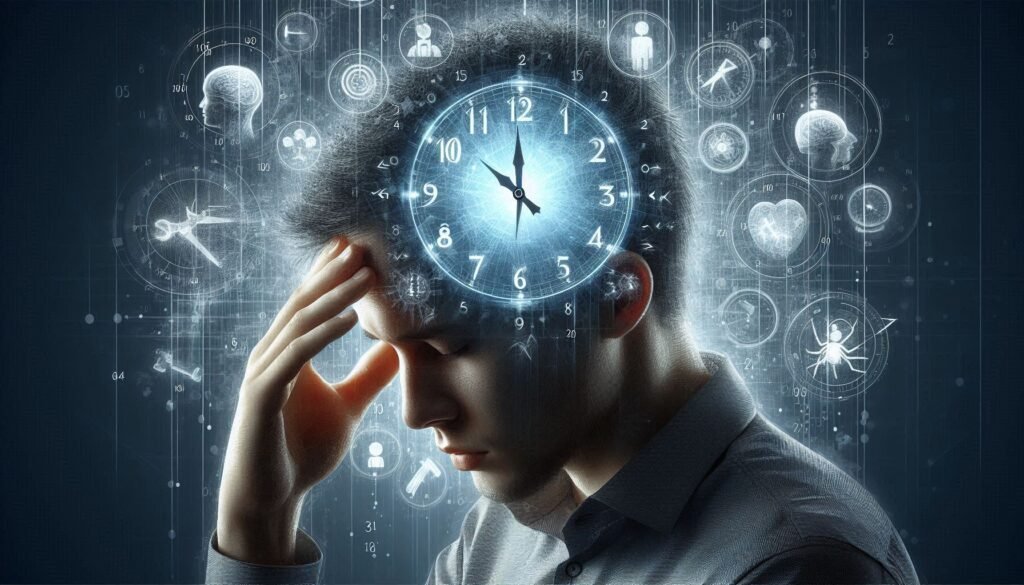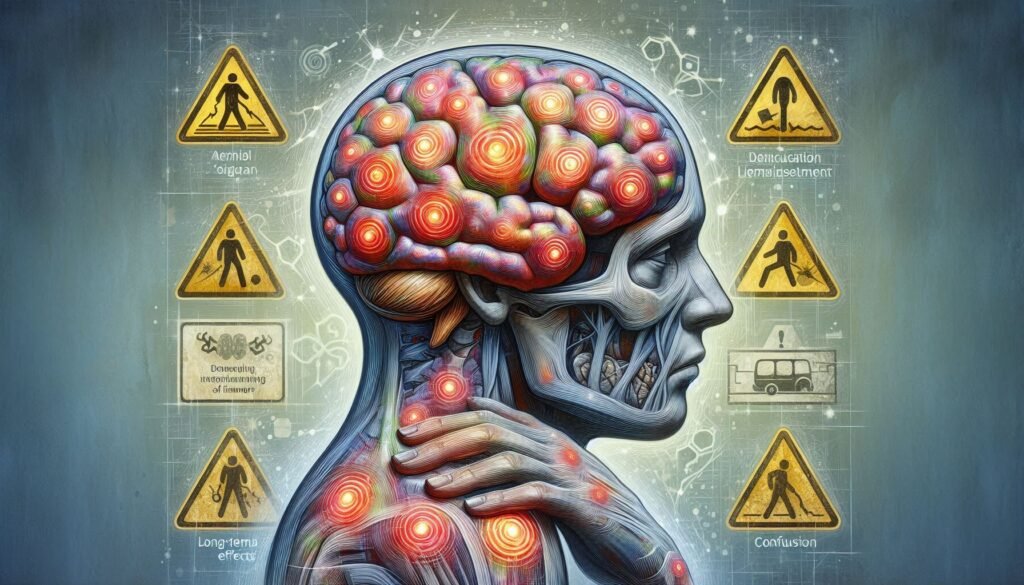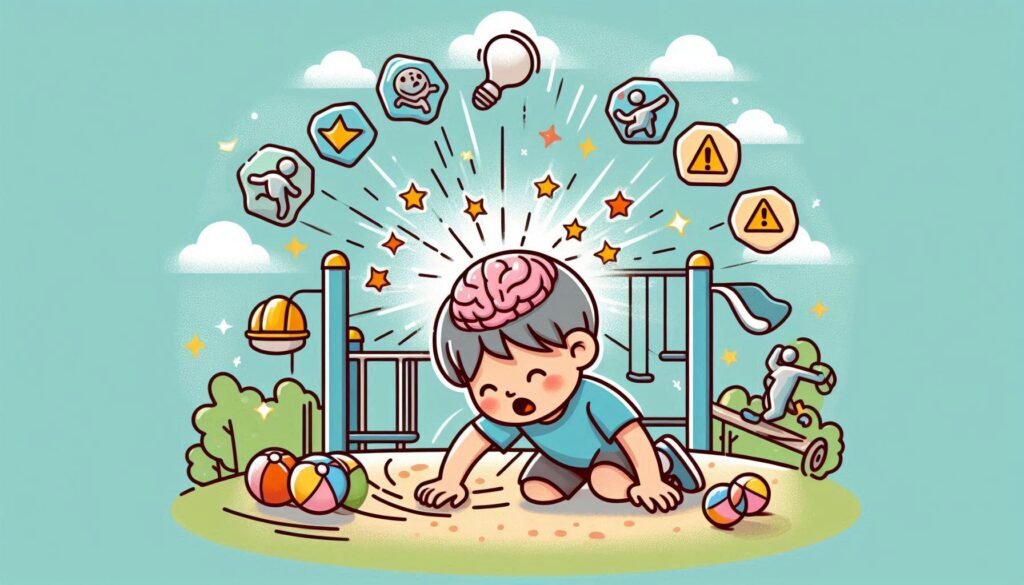A concussion is often seen as a straightforward injury, typically linked to an immediate headache or dizziness after a blow to the head. However, what many don’t realize is that the effects of a concussion can be delayed. It’s not uncommon for symptoms to emerge days or even weeks after the initial incident, leading to confusion and concern among those affected and their loved ones.
Understanding delayed concussion symptoms is essential for anyone who has experienced a head injury. Recognizing these signs can significantly impact recovery and overall well-being. In this article, we’ll explore what you need to watch for after sustaining a head injury so that you’re equipped with knowledge when it matters most. Whether it’s cognitive changes or emotional shifts, being informed helps in identifying when something isn’t right following your accident. Let’s dive into the world of delayed concussion symptoms and learn how to stay ahead of potential complications!

Understanding the Phenomenon of Delayed Concussion Symptoms
Delayed concussion symptoms can be puzzling and concerning. After a head injury, individuals may feel fine initially, only for symptoms to manifest later on. This phenomenon often leads to confusion about the severity of the injury.
The brain is complex, and its response to trauma varies from person to person. In some cases, damage may occur at a cellular level that takes time to surface. Factors like individual health history and stress levels can influence how quickly or slowly these symptoms appear.
Commonly reported delayed signs include headaches, dizziness, fatigue, and changes in mood or cognition. It’s crucial for those recovering from head injuries to remain vigilant even after feeling well initially.
Understanding this delay helps in recognizing that recovery isn’t always linear. Awareness empowers individuals and their support networks to address any emerging concerns promptly before they escalate into more serious complications.
Common Delayed Symptoms Following a Concussion
Delayed concussion symptoms can emerge unexpectedly after a head injury. These symptoms may not appear until days or even weeks later, leading to confusion and concern for those affected. Recognizing these signs is crucial for timely intervention and recovery.
One common delayed symptom is persistent headaches. These can vary in intensity and might resemble tension or migraine-like pain. Individuals often report that they feel more sensitive to light or sound during these episodes, making daily activities challenging.
Another frequent issue includes dizziness or balance problems. This disorientation can be frustrating, impacting both coordination and the ability to perform everyday tasks safely.
Fatigue is also prevalent among those experiencing delayed symptoms. It can manifest as an overwhelming sense of tiredness that doesn’t improve with rest, affecting both physical energy levels and cognitive function throughout the day.
Cognitive Changes: Memory and Concentration Issues
Cognitive changes are common delayed concussion symptoms that can significantly impact daily life. Individuals may experience difficulties with memory, finding it hard to recall information or follow conversations. This can be particularly frustrating for those who value their mental agility.
Concentration issues often accompany memory problems. Tasks that once seemed simple may become overwhelming. People might struggle to focus on work, reading, or even watching TV without losing track of what they were doing.
These cognitive impairments can also extend beyond immediate tasks. For example, someone might forget appointments or misplace essential items around the house. This disorganization adds another layer of stress and confusion to their lives.
It’s important to recognize these changes early on for effective management and recovery strategies. Monitoring any shifts in cognitive function after a head injury is crucial for ensuring proper care and support during the healing process.
Emotional and Behavioral Shifts: Mood Swings and Irritability
Emotional and behavioral shifts are often overlooked in discussions about delayed concussion symptoms. After a head injury, individuals may experience unexpected changes in their mood. This can manifest as sudden irritability or intense mood swings that seem disproportionate to the situation.
These emotional fluctuations can make it challenging for those affected to communicate effectively with others. Friends and family might notice these changes even if the person suffering is unaware of them. Mood disruptions can lead to social isolation, increasing feelings of frustration and sadness.
Irritability following a concussion may stem from neurological disruptions caused by trauma. The brain’s ability to regulate emotions becomes compromised, leading to heightened responses to stressors that were previously manageable.
Understanding these potential emotional shifts is crucial for both individuals recovering from concussions and their support networks. Recognizing that irritability isn’t just a personality change but rather a symptom of recovery helps foster empathy and patience during this challenging time.
Sleep Disturbances as a Delayed Concussion Symptom
Sleep disturbances are a common yet often overlooked symptom of delayed concussion. After a head injury, individuals may experience changes in their sleep patterns that can significantly affect daily life. These disruptions might include trouble falling asleep, staying asleep, or waking up too early.
Many people with delayed concussion symptoms report feeling excessively sleepy during the day or struggling with insomnia at night. This lack of restorative sleep can exacerbate other cognitive and emotional issues related to concussions. As fatigue sets in, it becomes even harder to concentrate and manage stress effectively.
The relationship between sleep and brain function is crucial. Sleep plays an essential role in healing after a traumatic brain injury. Without adequate rest, recovery can be prolonged and complicated by additional symptoms like irritability or mood swings.
If you notice persistent changes in your sleeping habits following a head injury, it’s important to pay attention. These disturbances could indicate more serious underlying issues related to the concussion that require professional assessment.
Physical Symptoms That May Appear Days or Weeks Later
After a head injury, some individuals may not experience immediate symptoms. Instead, physical signs of a concussion can emerge days or even weeks later. This delayed response can be confusing and concerning for those affected.
Common physical symptoms include headaches that intensify over time. These headaches might differ from typical tension or migraine types, often feeling more persistent and pressure-like. Additionally, dizziness is another alarming symptom that may develop later on. Individuals might feel unsteady or lightheaded during daily activities.
Another notable symptom is fatigue. People often report overwhelming tiredness that doesn’t seem to correlate with their activity levels. This lack of energy can impact overall functioning.
Visual disturbances also warrant attention; these may manifest as blurred vision or sensitivity to light. Such changes could affect reading or screen use, further complicating recovery after a concussion.
The Importance of Monitoring for Delayed Symptoms
Monitoring for delayed concussion symptoms is crucial after any head injury. Many people assume that once initial symptoms subside, they are in the clear. However, some signs can emerge days or even weeks later. This unpredictability makes vigilance essential.
Pay attention to changes in behavior or mood. Subtle shifts could indicate underlying issues related to the concussion that require attention. Keeping a journal of these changes can help track developments over time.
Cognitive function is another area to monitor closely. If someone has difficulty concentrating or experiences memory lapses well after a head injury, it may point toward delayed symptoms needing further evaluation.
Physical health shouldn’t be overlooked either. Symptoms like persistent headaches or dizziness can signal complications arising from the initial injury. Consistent monitoring allows for early intervention and better management of potential long-term effects on overall well-being.
When to Seek Medical Attention for Late-Onset Symptoms
Recognizing when to seek medical attention for delayed concussion symptoms is crucial. If you notice any unusual changes in behavior or cognitive abilities, it’s important to consult a healthcare professional. Symptoms such as confusion, persistent headaches, and memory problems should not be ignored.
If emotional changes manifest—like severe mood swings or irritability—it can indicate that the brain is struggling post-injury. These behavioral shifts often require evaluation by a specialist who understands concussions’ complexities.
Physical symptoms like dizziness, nausea, or balance issues also warrant immediate attention. Experiencing these signs days or weeks after the initial injury could suggest complications that need assessment.
If sleep disturbances worsen or insomnia develops alongside other symptoms, don’t hesitate to reach out for help. Addressing these late-onset symptoms early can significantly improve recovery outcomes and prevent long-term effects on health and well-being.
Potential Complications of Untreated Delayed Symptoms
Untreated delayed concussion symptoms can lead to significant complications that affect daily life. One major concern is the risk of developing chronic traumatic encephalopathy (CTE). This progressive neurodegenerative disease has been linked to repeated head injuries and may manifest years after the initial injury.
Another potential complication is prolonged recovery time. Without proper management, individuals might experience lingering symptoms, which could interfere with work, school, or social activities. The struggle to cope with these ongoing issues can lead to frustration and decreased quality of life.
Furthermore, untreated symptoms may exacerbate existing mental health conditions like anxiety or depression. Emotional disturbances from a concussion can create a vicious cycle where mood swings contribute to cognitive problems and vice versa.
There’s an increased risk for further injuries when delayed symptoms go unchecked. Issues such as balance problems or dizziness could make individuals more prone to additional falls or accidents, complicating their overall health situation significantly.
Management Strategies for Delayed Concussion Symptoms
Managing delayed concussion symptoms requires a multifaceted approach. First and foremost, rest is crucial. Both physical and cognitive rest can significantly aid recovery. Avoid activities that require intense concentration or physical exertion during this time.
Gradually reintroducing normal activities under medical guidance is essential for a safe return to daily life. Engaging in light exercises after consultation with your healthcare provider can help ease the transition back into routine without triggering symptoms.
Cognitive therapies may also play an important role in management strategies, particularly if memory and concentration issues arise. Working with specialists such as occupational therapists or neuropsychologists can offer tailored techniques to improve cognitive functions effectively.
Support from family and friends cannot be overlooked either; emotional support helps alleviate stress which could exacerbate symptoms further. Consider joining support groups where individuals share experiences related to delayed concussion symptoms, promoting both understanding and healing.
Regular follow-ups with a healthcare professional ensure ongoing monitoring of symptom progression and adaptation of management strategies as needed. By taking these steps seriously, individuals experiencing delayed concussion symptoms can work toward regaining their health more efficiently while minimizing potential long-term complications.


